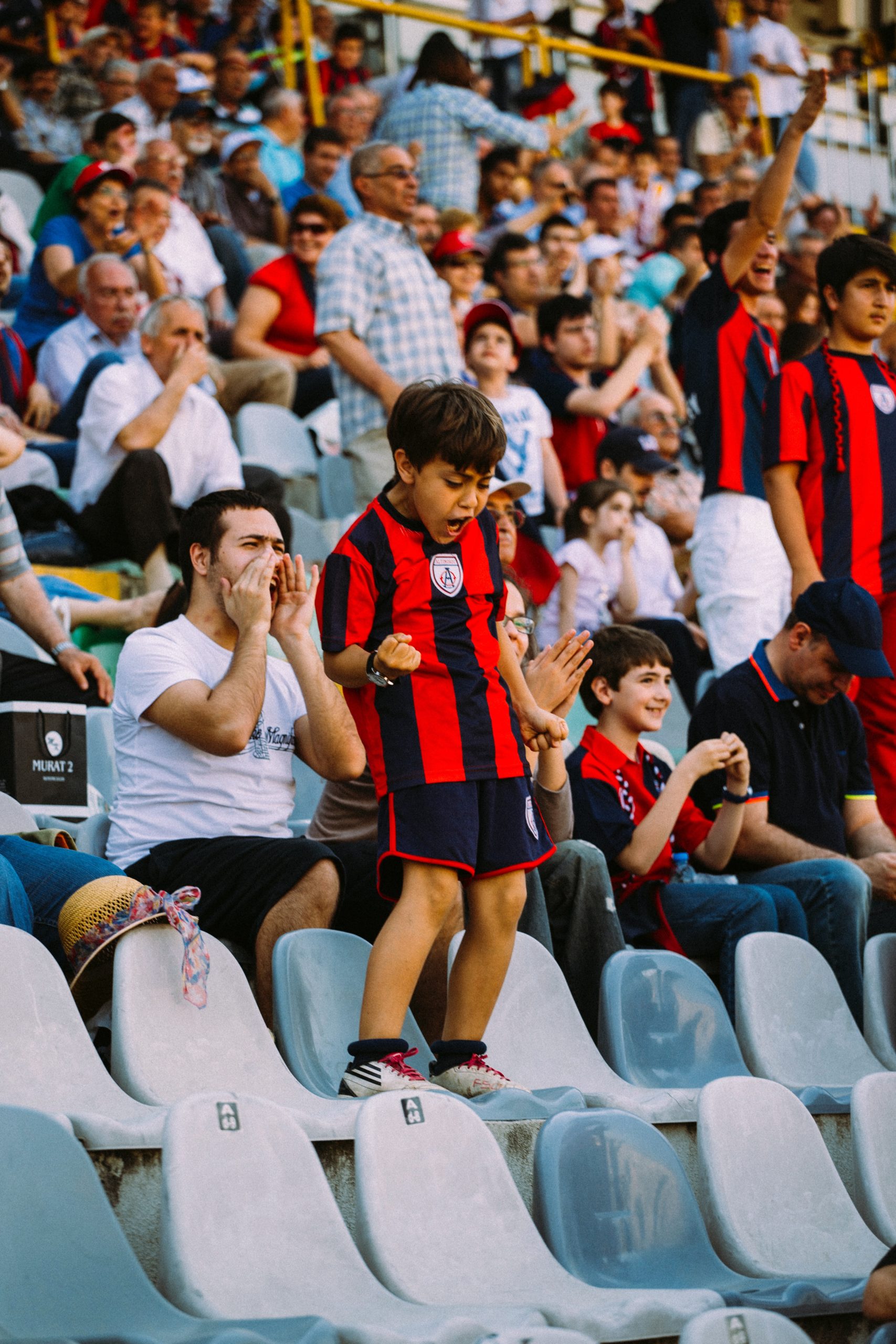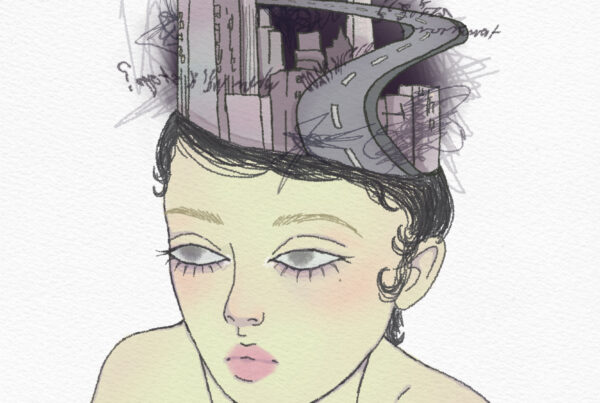
Pride is usually an emotion that arises from our own actions – we feel proud of our own successes and accomplishments. But what about the pride we feel when our national football club scores a goal? Or when our favourite volleyball team aces a set? Or when our favourite basketball player scores a basket? People can evidently feel proud of others’ athletic performance, so it seems worthwhile to investigate the how and the why of sports fans’ pride.
Pride is usually an emotion that arises from our own actions – we feel proud of our own successes and accomplishments. But what about the pride we feel when our national football club scores a goal? Or when our favourite volleyball team aces a set? Or when our favourite basketball player scores a basket? People can evidently feel proud of others’ athletic performance, so it seems worthwhile to investigate the how and the why of sports fans’ pride.
Pride is most commonly defined as a self-related emotion. It is the positive feeling that arises when one puts in the effort and achieves a (socially valued) outcome (Hooge & Osch, 2021). This is reflected in statements such as ‘I am proud of my win’, ‘I am proud of my grades’, ‘I am proud of my art’ – these are all successes that are likely based on one’s own effort. However, I’d like you to take a second and imagine yourself in the crowd of a sports event. There is loud screaming, people are ready to jump off their seats, and the air is brimming with excitement. As your favourite team or athlete scores a point, half the arena bursts into loud yelling, roaring and whistling – all this noise to express happiness and pride in your favourite sportsmen. After the successful match, you go home with the same brimming energy that filled the stadium. A proud smile lights up your face every time you share the story of how your team won: ‘I always knew they’re the best’.
But while proudly basking in the glory of your team’s success, did you ever wonder why you were able to feel proud although you were only sitting in the crowd and not playing on the field? Strictly speaking, sports fans neither score goals, nor do they coach the players, yet they are proud of their team. Self-related pride cannot explain this phenomenon, therefore, the term pride must be expanded to include other people. Psychology provides us with two concepts of other-related pride, and there seems to be quite the debate about which one of the two is more applicable in the context of sports fandom.
On the one hand, there is vicarious or second-hand pride, which refers to someone feeling proud of another’s success while being perfectly aware that they did not contribute anything to it (Hooge & Osch, 2021). This concept applies to the above notion that, although fans did not contribute to athletes’ wins in the narrow sense, they share the sportsmen’s pride. To explain phenomena of shared emotion, scientists usually refer to mirror neurons. These are the nerve cells in our brains that likely play the main role in empathic mimicry (Iacoboni & Lenzi, 2002; Lee et al., 2013). In simple terms, this means that humans are neurologically wired to engage in the emotions of those we like and feel close to, so we are naturally able to feel emotions second-handedly. Therefore, it should not come as a surprise that we happily let ourselves be infected with our favourite players’ joyous pride, even though one can argue we technically did not contribute to it.
At the other end of the debate, some people share the strong conviction that fans are an integral part of athletic success. Anecdotal arguments suggest that the fans’ expression of support has a motivating effect on teams – after all, some studies support the existence of the so-called home advantage, where teams appear more likely to win when playing in their home country or city (Schwartz & Barsky, 1977). This is supposedly the case because ‘at home’, there is a generally more positive and cheerful atmosphere for the home-team as opposed to the away-team. What is more, fans can indirectly support their team financially by buying their merch or supporting the brands that sponsor the team; and research has indeed found that fan-identification has a positive effect on purchasing-behaviours related to the team’s sponsors (Schlesinger & Güngerich, 2011). Therefore, in this broader sense of support, one can argue that fans are a valuable contribution and that taking credit for their team’s accomplishment is justified. Such accounts would lead to a re-evaluation of sports team pride: It is not vicarious, but group-related, because the pride arises due to shared effort (Hooge & Osch, 2021).
“Humans are neurologically wired to engage in the emotions of those we like and feel close to, so we are naturally able to feel emotions second-handedly.”
Whether you lean more towards the vicarious or group-level side of the argument, for both types of pride there seem to be a few factors that moderate whether or not pride is elicited. These factors include identification with and closeness to the successful other(s) (Davies, 2018). In the context of sports fandom, the support you dedicate to your home team is likely driven by feelings of identification and closeness – after all, you share a similar life experience with those players that grew up in and represent your hometown! If we consider the World Cup, most fans are also most likely to root for their home country, probably because the shared nationality evokes identification and closeness. Furthermore, fans know that professional athletes put a great deal of blood, sweat and tears into their profession – this circumstance also increases vicarious pride, because the latter is more likely to occur when the other is perceived to have invested great effort in their achievement (ibid.). Therefore, it appears plausible that one feels proud of sports teams that share one’s work ethic, traditions or heritage (Demmett, 2011) because work ethic presumes pre-achievement effort, and shared traditions and heritage likely increase feelings of identification and closeness.
After exploring what factors contribute to vicarious or group-level pride, the question remains: What do we gain from feeling proud of another person’s achievement? After all, self-related pride can be easily explained as a motivator to overcome adversity in pursuit of our goals (Davies, 2018). In other words, self-related pride makes us persevere because we want to experience more of that positive, joyous emotion. This motivating component is indirectly applicable to sports fan’s pride, since cheers and chants are likely to have a positive effect on the team. However, the motivating component is not applicable in a direct sense, since you seldomly get to hang out with your favourite football-player and tell them to keep up the great work. To understand the function of sports fan pride, it therefore appears reasonable to take a look at how pride affects the fans: There are numerous ways in which a fan can express pride, ranging from wearing their team’s merchandise to performing rituals like singing “The Flowers of Scotland” or performing the All Black’s Haka. Such open expressions of fandom not only intimidate the rivalling players, they also create a sense of community within the fandom. “Fandom connects us to other like-minded people, which satisfies our human need for belonging”, says a psychology professor at Murray State University (as cited in Stieg, 2020). It is suggested that shared pride helps in creating a group identity, which boosts self-esteem (Hooge & Osch, 2018). It is furthermore found that fandom, as expressed in shared rituals and apparel, ties people together in a kind of solidarity that transcends the sports context and holds people together in their personal lives as well (Cottingham, 2012). What follows is that shared pride in sports fandoms is beneficial to social coherence since it seems to bring and hold people together.
“Fandom, as expressed in shared rituals and apparel, ties people together in a kind of solidarity that transcends the sports context and holds people together in their personal lives as well.”
Despite these proposed benefits of group-pride, an article on sports fandom is unlikely to not mention hooliganism. The term is a common association with huge football events, and we might have vivid images of the violent actions that emerge between the FC Barcelona’s and Real Madrid’s rival fans – or the Moroccan hooliganism that took place in the current World Cup (Lesprat, 2022). Yet, hooliganism describes a broad range of violent actions that may or may not be originally rooted in a passion for sports (Spaaij, 2008). There is the general consensus that hooliganism fulfils a similar function to shared pride, namely the creation of a collective identity and expression of solidarity (ibid.). However, research also investigated the sociological roots of hooliganism that are proposed to lie in political extremism and dissatisfaction with society (ibid.; Abell et al., 2007).Thus, although hooliganism has a similar function to other-related-pride, it seems to be distinct from it.
With these last remarks, this article concludes that sports fans’ pride is a fascinating phenomenon that is surrounded by the debate of who deserves credit for success. Pride in sports can facilitate group-identity and therefore community, which is socially beneficial. Whether or not you consider yourself a contribution to your favourite athletes’ accomplishments or not, hopefully this article has shown you that shared pride with others can make you enjoy your favourite matches even more! <<
References
– Abell, J., Condor, S., Lowe, R. D., Gibson, S., & Stevenson, C. (2007). Who ate all the pride? Patriotic sentiment and English national football support. Nations and nationalism, 13(1), 97-116.
– Davis, J. (2018). “I’m proud of you”: Investigating the antecedents and functions of vicarious pride. (Doctoral dissertation, UNSW Sydney).
– De Hooge, I. E., & Van Osch, Y. (2021). I feel different, but in every case I feel proud: Distinguishing self-pride, group-pride, and vicarious-pride. Frontiers in Psychology, 12.
– Demmett, R. (2017, October 1). We are all proud of our favourite sports teams, but what makes us proud? Bleacher Report. https://bleacherreport.com/articles/762581-we-are-all-proud-of-our-favorite-sports-teams-but-what-makes-us-proud
– Iacoboni, M., & Lenzi, G. L. (2002). Mirror neurons, the insula, and empathy. Behavioral and Brain Sciences, 25(1), 39-40.
– Lee, H. W., Do Kim, Y., Newman, J. I., & Kim, Y. (2013). Group emotion in spectator sport: An interdisciplinary approach to affective qualia. Journal of Multidisciplinary Research (1947-2900), 5(2).
– Lesprit, H. (2022, Nov. 28). Morocco vs. Belgium: Europe in the Flames of Football Hooligans. The Muslim Skeptic . https://muslimskeptic.com/2022/11/28/morocco-vs-belgium-europe-in-the-flames-of-football-hooligans/
– Stieg, C. (2020b, Jul 23). Sports fans have higher self-esteem and are more satisfied with their lives (whether their teams win or lose). CNBC . https://www.cnbc.com/2020/07/23/why-being-a-sports-fan-and-rooting-for-a-team-is-good-for-you.html
– Spaaij, R. (2008). Men like us, boys like them: Violence, masculinity, and collective identity in football hooliganism. Journal of Sport and Social Issues, 32(4), 369-392.
Pride is most commonly defined as a self-related emotion. It is the positive feeling that arises when one puts in the effort and achieves a (socially valued) outcome (Hooge & Osch, 2021). This is reflected in statements such as ‘I am proud of my win’, ‘I am proud of my grades’, ‘I am proud of my art’ – these are all successes that are likely based on one’s own effort. However, I’d like you to take a second and imagine yourself in the crowd of a sports event. There is loud screaming, people are ready to jump off their seats, and the air is brimming with excitement. As your favourite team or athlete scores a point, half the arena bursts into loud yelling, roaring and whistling – all this noise to express happiness and pride in your favourite sportsmen. After the successful match, you go home with the same brimming energy that filled the stadium. A proud smile lights up your face every time you share the story of how your team won: ‘I always knew they’re the best’.
But while proudly basking in the glory of your team’s success, did you ever wonder why you were able to feel proud although you were only sitting in the crowd and not playing on the field? Strictly speaking, sports fans neither score goals, nor do they coach the players, yet they are proud of their team. Self-related pride cannot explain this phenomenon, therefore, the term pride must be expanded to include other people. Psychology provides us with two concepts of other-related pride, and there seems to be quite the debate about which one of the two is more applicable in the context of sports fandom.
On the one hand, there is vicarious or second-hand pride, which refers to someone feeling proud of another’s success while being perfectly aware that they did not contribute anything to it (Hooge & Osch, 2021). This concept applies to the above notion that, although fans did not contribute to athletes’ wins in the narrow sense, they share the sportsmen’s pride. To explain phenomena of shared emotion, scientists usually refer to mirror neurons. These are the nerve cells in our brains that likely play the main role in empathic mimicry (Iacoboni & Lenzi, 2002; Lee et al., 2013). In simple terms, this means that humans are neurologically wired to engage in the emotions of those we like and feel close to, so we are naturally able to feel emotions second-handedly. Therefore, it should not come as a surprise that we happily let ourselves be infected with our favourite players’ joyous pride, even though one can argue we technically did not contribute to it.
At the other end of the debate, some people share the strong conviction that fans are an integral part of athletic success. Anecdotal arguments suggest that the fans’ expression of support has a motivating effect on teams – after all, some studies support the existence of the so-called home advantage, where teams appear more likely to win when playing in their home country or city (Schwartz & Barsky, 1977). This is supposedly the case because ‘at home’, there is a generally more positive and cheerful atmosphere for the home-team as opposed to the away-team. What is more, fans can indirectly support their team financially by buying their merch or supporting the brands that sponsor the team; and research has indeed found that fan-identification has a positive effect on purchasing-behaviours related to the team’s sponsors (Schlesinger & Güngerich, 2011). Therefore, in this broader sense of support, one can argue that fans are a valuable contribution and that taking credit for their team’s accomplishment is justified. Such accounts would lead to a re-evaluation of sports team pride: It is not vicarious, but group-related, because the pride arises due to shared effort (Hooge & Osch, 2021).
“Humans are neurologically wired to engage in the emotions of those we like and feel close to, so we are naturally able to feel emotions second-handedly.”
Whether you lean more towards the vicarious or group-level side of the argument, for both types of pride there seem to be a few factors that moderate whether or not pride is elicited. These factors include identification with and closeness to the successful other(s) (Davies, 2018). In the context of sports fandom, the support you dedicate to your home team is likely driven by feelings of identification and closeness – after all, you share a similar life experience with those players that grew up in and represent your hometown! If we consider the World Cup, most fans are also most likely to root for their home country, probably because the shared nationality evokes identification and closeness. Furthermore, fans know that professional athletes put a great deal of blood, sweat and tears into their profession – this circumstance also increases vicarious pride, because the latter is more likely to occur when the other is perceived to have invested great effort in their achievement (ibid.). Therefore, it appears plausible that one feels proud of sports teams that share one’s work ethic, traditions or heritage (Demmett, 2011) because work ethic presumes pre-achievement effort, and shared traditions and heritage likely increase feelings of identification and closeness.
After exploring what factors contribute to vicarious or group-level pride, the question remains: What do we gain from feeling proud of another person’s achievement? After all, self-related pride can be easily explained as a motivator to overcome adversity in pursuit of our goals (Davies, 2018). In other words, self-related pride makes us persevere because we want to experience more of that positive, joyous emotion. This motivating component is indirectly applicable to sports fan’s pride, since cheers and chants are likely to have a positive effect on the team. However, the motivating component is not applicable in a direct sense, since you seldomly get to hang out with your favourite football-player and tell them to keep up the great work. To understand the function of sports fan pride, it therefore appears reasonable to take a look at how pride affects the fans: There are numerous ways in which a fan can express pride, ranging from wearing their team’s merchandise to performing rituals like singing “The Flowers of Scotland” or performing the All Black’s Haka. Such open expressions of fandom not only intimidate the rivalling players, they also create a sense of community within the fandom. “Fandom connects us to other like-minded people, which satisfies our human need for belonging”, says a psychology professor at Murray State University (as cited in Stieg, 2020). It is suggested that shared pride helps in creating a group identity, which boosts self-esteem (Hooge & Osch, 2018). It is furthermore found that fandom, as expressed in shared rituals and apparel, ties people together in a kind of solidarity that transcends the sports context and holds people together in their personal lives as well (Cottingham, 2012). What follows is that shared pride in sports fandoms is beneficial to social coherence since it seems to bring and hold people together.
“Fandom, as expressed in shared rituals and apparel, ties people together in a kind of solidarity that transcends the sports context and holds people together in their personal lives as well.”
Despite these proposed benefits of group-pride, an article on sports fandom is unlikely to not mention hooliganism. The term is a common association with huge football events, and we might have vivid images of the violent actions that emerge between the FC Barcelona’s and Real Madrid’s rival fans – or the Moroccan hooliganism that took place in the current World Cup (Lesprat, 2022). Yet, hooliganism describes a broad range of violent actions that may or may not be originally rooted in a passion for sports (Spaaij, 2008). There is the general consensus that hooliganism fulfils a similar function to shared pride, namely the creation of a collective identity and expression of solidarity (ibid.). However, research also investigated the sociological roots of hooliganism that are proposed to lie in political extremism and dissatisfaction with society (ibid.; Abell et al., 2007).Thus, although hooliganism has a similar function to other-related-pride, it seems to be distinct from it.
With these last remarks, this article concludes that sports fans’ pride is a fascinating phenomenon that is surrounded by the debate of who deserves credit for success. Pride in sports can facilitate group-identity and therefore community, which is socially beneficial. Whether or not you consider yourself a contribution to your favourite athletes’ accomplishments or not, hopefully this article has shown you that shared pride with others can make you enjoy your favourite matches even more! <<



